Before their recent resurgence, Red Bull Racing experienced several years of playing second fiddle during Mercedes’ era of dominance in Formula 1. After Red Bull’s four consecutive championship wins from 2010 to 2013, Mercedes emerged as the dominant force with the introduction of the turbo-hybrid era in 2014. Despite sporadic race wins and continuous development, Red Bull struggled to consistently challenge Mercedes’ supremacy, often battling against Ferrari for the position of “best of the rest.” It wasn’t until significant regulatory changes and strategic team advancements that Red Bull repositioned itself at the forefront of the competition, ending Mercedes’ prolonged period of dominance.
Inside Red Bull’s Rocket Ship – Summary
Max Verstappen’s remarkable season with Red Bull saw him win 15 out of 19 races, nearly securing his third consecutive championship title. The RB19 car, touted as one of the best in Formula 1 history, contributed heavily to the team’s dominance.
Team Principal Christian Horner praised the team’s effort, especially under challenging circumstances, for producing such a competitive car. Red Bull’s success is attributed to consistency at the front of the field and excellence in every area from design to daily operations.
Key highlights of the car’s success:
1. Design: The stable rules allowed Red Bull an advantage, and their RB19 was a refined version of their earlier model, RB18. Chief Technical Officer Adrian Newey and Technical Director Pierre Wache emphasized weight, weight distribution, and better handling at different speeds during the design phase.
2. Development: Despite limited aerodynamic developments, Red Bull made significant performance improvements in Azerbaijan and Hungary. The team had to be more selective due to reductions in their wind tunnel time, pushing them to prioritize efficiency.
3. Day-to-day: The RB19’s adaptability and predictability across various circuits set it apart. It was easy to adjust to each circuit’s specifics, and its overall performance was exceptional.
4. In the cockpit: While the RB19 was faster than its competitors, its potential was truly realized by Verstappen. He dominated most races, leaving competitors far behind. His confidence and synergy with the RB19 have been critical.
Horner acknowledges the team’s golden run but insists on avoiding complacency, emphasizing the need to keep pushing boundaries. This determination poses a challenge for Red Bull’s competitors.
Applying the success story as a guide for App or Product Development
The success story of Red Bull and their RB19 car in the racing world can serve as an analogy for product or app development in the tech industry. Here’s how the principles that drove Red Bull’s dominance can be applied to app or product development:
1. Consistency and Adaptability:
– Racing: Red Bull consistently performed at the front and adapted to different circuits.
– Product Development: Ensure that your app provides a consistent user experience across different platforms and devices. It should be adaptive to different user scenarios and needs.
2. Deep Understanding of the Rules (or Market):
– Racing: Red Bull deeply understood the regulations, which allowed them to design the RB19 optimally.
– Product Development: Understand the market and user needs deeply. Knowing current industry standards and trends can help in creating a product that stands out.
3. Continuous Improvement and Evolution:
– Racing: The RB19 was an evolution of the RB18, improving upon its shortcomings.
– Product Development: Always iterate on your product based on user feedback and changing market dynamics. An app should evolve based on the needs of its users.
4. Efficiency in Development:
– Racing: Red Bull was selective and efficient with their improvements, focusing on what would yield the most significant results.
– Product Development: Prioritize features and improvements that would most benefit users, and ensure efficient use of resources during development.
5. Predictability and Reliability:
– Racing: The RB19 was known for its predictable behavior across different tracks.
– Product Development: Your product or app should be reliable, minimizing bugs or crashes, and providing a consistent and predictable user experience.
6. Maximizing Potential through Collaboration:
– Racing: While the RB19 was an excellent car, its potential was fully realized through Verstappen’s skills.
– Product Development: A product is only as good as the team behind it. Collaborate effectively, combining the skills of designers, developers, marketers, and other stakeholders to maximize the product’s potential.
7. Stay Ahead of the Curve:
– Racing: Red Bull’s determination to keep pushing boundaries ensures they remain ahead of their competitors.
– Product Development: Innovate and avoid complacency. Regularly update your product to stay ahead of competitors and meet changing user needs.
Applying these principles, product and app developers can create robust, adaptive, and user-centric products that stand out in the market.




